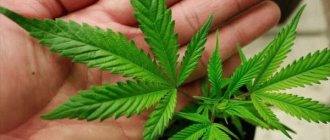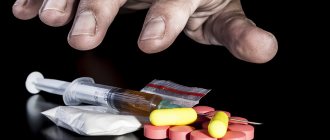What is Article 228 of the Criminal Code of the Russian Federation about?
Article 228
provides punishment for the illegal acquisition, storage, transportation, manufacture, processing of narcotic drugs, psychotropic substances or their analogues, as well as plants or their parts containing these substances (hereinafter referred to as narcotic drugs).
Article 228.1
(she was charged with Ivan Golunov) - for the production, sale or transfer of narcotic drugs.
Article 228.2
— for violating the rules of drug trafficking.
Article 228.3 and 228.4
- for the illegal acquisition, storage, transportation, production, sale or transfer of drug precursors (that is, substances used to manufacture drugs).
In addition to Article 228 with all its parts, penalties related to drug trafficking are contained in Articles 229–233 of the Criminal Code.
The Code of Administrative Offenses also provides for administrative penalties for drug-related crimes. In particular, illicit trafficking in narcotic and psychotropic substances (Article 6.8 of the Administrative Code), propaganda of narcotic drugs (6.13), consumption in public places (20.20).
Drug Lawyer
The criminal legal policy of Russia is characterized by an increasing strengthening of penalties for committing crimes related to illicit drug trafficking. The law has long classified drug crimes as particularly serious, and its latest changes have given the courts the ability to impose life imprisonment.
In reality, the hostages of such harsh penalties are young people who have frivolously violated the law for the first time, victims of “dose planting,” as well as persons who unintentionally contributed to the illegal transportation, storage or sale of prohibited substances. Cases where “provocateurs”, under the control of law enforcement agencies, deliberately and methodically incite the illegal acquisition and sale of narcotic drugs, ruining the fate of those who succumb to persuasion with their criminal actions, are becoming increasingly widespread...
It is our professional duty to oppose such injustice and lawlessness while protecting and preserving the freedoms and values of our clients.
The Domkins and Partners Law Office has been specializing in defense of complex criminal cases involving drug trafficking for over ten years, providing legal assistance and professional defense in this category of crimes.
Priorities of professional activity:
A drug lawyer is primarily a professional in the field of criminal law, criminology, medicine and addiction medicine, as well as related fields and sciences.
Many years of practice, the use of accumulated experience in each case is our professional basis in protecting the client.
Solving complex problems in criminal cases involving drugs and psychotropic substances, involving a versatile, sometimes non-standard approach and extensive work of a lawyer.
Lines of defense:
- With the results of their practice, the Bureau’s lawyers have repeatedly refuted the prevailing opinion that “if you are detained red-handed, the defense attorney will not be of much help,” since it will not be difficult to prove the guilt of the detainee. In a number of cases, lawyers stick to the line, proving the illegality of the criminal case due to the provocation to commit a crime by law enforcement officers and the persons involved by them. The current law determines that provocation of a crime is the basis for declaring criminal prosecution illegal.
- In a number of cases, the Bureau's lawyers use a line of defense to challenge the incorrect classification of the crime , for example, when assistance in the acquisition of narcotic drugs by investigative authorities is incorrectly classified as their illegal sale. The difference in the consequences of such a “legal error” is that in the first case, the accused has a “chance” of being assigned a suspended sentence by the court, in the second case, the minimum punishment for the accused is twelve years in prison.
- As one of the priority lines of defense, the Bureau's lawyers use the lack of intent to commit a crime, when the lawyer manages to prove that the suspect did not understand the criminality of his actions, because he was misled and used as an “instrument of crime” in the wrong hands . Of course, this line of defense requires extensive work by the lawyer to collect and present relevant evidence to the investigation and the court, as well as their legal justification in favor of the client.
- The line of defense is aimed at the complete acquittal of the client in view of his non-involvement in the crime and the lack of proof that the crime was committed.
- When the client chooses the position of recognizing the crime committed, the goal of our lawyer is to build a line of defense and present to the court evidence that will allow the court to: apply a suspended sentence to the defendant , impose a non-custodial sentence, or apply less stringent penalties than those provided for by law. A competent line of defense built by a lawyer, which presupposes the cooperation of the accused with the investigation even in cases of illegal sales, allows our lawyers to achieve suspended sentence.
Suspended sentence for sale of narcotic drugs
Imposing a fine under Article 228 of the Criminal Code of the Russian Federation
Reclassification of the charge to a less serious one
Of course, the list of client protection methods used by the Bureau’s lawyers is not exhaustive. Each criminal case related to illegal drug trafficking is unique in its own way and requires an individual approach to protecting the client’s freedom.
Activities:
- Oral and written consultation , during which the lawyer studies the current situation, determines the legal prospects for the case, recommends to the client the line of defense that should be applied, and also gives practical advice on further interaction with the investigative authorities.
- Client protection at the preliminary investigation stage, providing for the use by the lawyer of all rights granted by law and methods of protecting his client:
- development of a strategy for protecting interests;
- collection and presentation by the lawyer of evidence of the client’s innocence;
- involvement of specialists and experts in a criminal case to formulate evidence for the defense;
- conducting alternative examinations of the case;
- filing motions to substantiate and confirm the position of the defense;
- participation of a lawyer in investigative actions, including those carried out with his client;
- appealing the legality of investigative actions;
- conducting a lawyer's investigation and presenting its results to the investigative body;
- familiarization with the materials of the criminal case and preparation of the final documents of the lawyer's office work;
- appealing in accordance with the established procedure the results of the trial at the investigation stage;
- implementation of other, not prohibited by law, means and methods of procedural protection of the client.
- Procedural protection during judicial consideration of a case , when appealing a court decision in the appellate, cassation and supervisory procedures.
The above list of legal assistance only outlines the guidelines for our activities and is not exhaustive. You can learn more about the categories of legal assistance in cases of crimes related to illegal trafficking in narcotic drugs and psychotropic substances on the Bureau’s website page – “Criminal Lawyer Services.”
The professional practice of the Bureau's lawyers in this category of cases is not limited to the Moscow region. If you need protection in a case of illegal drug trafficking, want to receive detailed legal advice on issues of concern, or want to provide professional defense of a lawyer to your family or friends, contact the Domkiny and Partners Law Office.
The cost depends on the list of legal tasks, the complexity of the case and the volume of legal services provided by the lawyer. You can find out about the possibility and conditions of providing legal assistance by calling the multi-channel telephone number
Procedural protection is provided for the following crimes:
- Lawyer under Article 228 of the Criminal Code of the Russian Federation - Illegal acquisition, storage, transportation, manufacture, processing of narcotic drugs, psychotropic substances or their analogues, as well as illegal acquisition, storage, transportation of plants containing narcotic drugs or psychotropic substances, or their parts containing narcotic drugs or psychotropic substances.
- Lawyer under Article 228.1. Criminal Code of the Russian Federation - Illegal production, sale or transfer of narcotic drugs, psychotropic substances or their analogues, as well as illegal sale or transfer of plants containing narcotic drugs or psychotropic substances, or their parts containing narcotic drugs or psychotropic substances.
- Lawyer under Article 228.2. Criminal Code of the Russian Federation - Violation of the rules of circulation of narcotic drugs or psychotropic substances.
- Lawyer under Article 228.3. Criminal Code of the Russian Federation - Illegal acquisition, storage or transportation of precursors of narcotic drugs or psychotropic substances, as well as illegal acquisition, storage or transportation of plants containing precursors of narcotic drugs or psychotropic substances, or their parts containing precursors of narcotic drugs or psychotropic substances.
- Lawyer under Article 228.4. Criminal Code of the Russian Federation - Illegal production, sale or transfer of precursors of narcotic drugs or psychotropic substances, as well as illegal sale or transfer of plants containing precursors of narcotic drugs or psychotropic substances, or their parts containing precursors of narcotic drugs or psychotropic substances.
- Lawyer under Article 229 of the Criminal Code of the Russian Federation - Theft or extortion of narcotic drugs or psychotropic substances, as well as plants containing narcotic drugs or psychotropic substances, or their parts containing narcotic drugs or psychotropic substances.
- Lawyer under Article 229.1 of the Criminal Code of the Russian Federation - Smuggling of narcotic drugs, psychotropic substances, their precursors or analogues, plants containing narcotic drugs, psychotropic substances or their precursors, or their parts containing narcotic drugs, psychotropic substances or their precursors, instruments or equipment located under special control and used for the manufacture of narcotic drugs or psychotropic substances.
- Lawyer under Article 230 of the Criminal Code of the Russian Federation - Inducement to consume narcotic drugs, psychotropic substances or their analogues.
- Lawyer under Article 231 of the Criminal Code of the Russian Federation - Illegal cultivation of plants containing narcotic drugs or psychotropic substances or their precursors
- Lawyer under Article 232 of the Criminal Code of the Russian Federation - Organization or maintenance of dens for the consumption of narcotic drugs, psychotropic substances or their analogues.
- Lawyer under Article 233 of the Criminal Code of the Russian Federation - Illegal issuance or forgery of prescriptions or other documents giving the right to receive narcotic drugs or psychotropic substances.
- Lawyer under Article 234 of the Criminal Code of the Russian Federation - Illegal trafficking of potent or toxic substances for the purpose of sale.
- Other crimes provided for by the Criminal legislation of Russia.
What punishment does violators face?
For the acquisition, storage, production of narcotic drugs without the purpose of sale (Article 228)
punishment is provided (depending on the size of the seized substances):
| Deprivation of liberty | Additionally | |
| To a significant extent | up to 3 years* | fine up to 40 thousand rubles, compulsory / corrective labor, restriction of freedom up to 3 years |
| Large size | from 3 to 10 years | fine up to 500 thousand rubles, restriction of freedom up to 1 year |
| In a particularly large size | from 10 to 15 years | fine up to 500 thousand rubles, restriction of freedom up to 1.5 years |
*in this case, imprisonment is not mandatory, but only one of the possible punishments
For illegal production and sale of drugs (Article 228.1)
The Criminal Code of the Russian Federation provides for imprisonment for up to 20 years, in exceptional cases up to life imprisonment.
| What is the sentence for violators under Art. 228.1 | Deprivation of liberty |
| Without aggravating circumstances | from 4 to 8 years |
| Sales in pre-trial detention centers, administrative buildings, sports, educational and transport facilities, through the media and the Internet | from 5 to 12 years |
| By a group of persons by prior conspiracy, in a significant amount | from 8 to 15 years |
| By an organized group, on a large scale, using official position, to a minor | from 10 to 20 years |
| In a particularly large size | from 15 to 20 years, for life |
Additionally, it is possible to impose a fine of up to 1 million rubles, restriction of freedom, deprivation of the right to hold certain positions or engage in certain activities.
The Criminal Code provides for exemption from criminal liability for the illegal acquisition, storage, transportation, manufacture and processing of drugs or precursors for persons who voluntarily surrendered these substances and actively contributed to the disclosure or suppression of crimes related to drug trafficking, the exposure of those who committed them, and the detection property obtained by criminal means. Illegal production and sale of narcotic substances or precursors (Articles 228.1 and 228.4) do not provide for exemption from liability.
Illegal sale of drugs: concept and corpus delicti
Criminal and administrative liability for drugs is provided for by the relevant articles of the Criminal Code of the Russian Federation and the Code of Administrative Offenses of the Russian Federation. Here are some of them that are relevant to the topic of this review:
- Art. 228 of the Criminal Code of the Russian Federation (purchase, storage, transportation, manufacture of drugs);
- Art. 228.1 of the Criminal Code of the Russian Federation (production, sale of narcotic substances, transfer and sale of drugs);
- Art. 6.8 Code of Administrative Offenses of the Russian Federation (drug trafficking);
- Art. 6.9 (drug consumption without a doctor’s prescription).
It should be borne in mind that there is not always liability for the production, sale or consumption of drugs. The corpus delicti for such acts occurs under certain circumstances. Thus, criminal liability for the sale of drugs implies that such an action was carried out in violation of the law. According to paragraph 13 of the Resolution of the Plenum of the Supreme Court of the Russian Federation dated June 15, 2006 No. 14, the sale of narcotic drugs is understood as the illegal activity of a person in their paid or gratuitous sale to another person, regardless of the method of such sale.
How is the size of drugs determined?
Significant, large and especially large sizes of narcotic substances and plants containing narcotic substances are approved by government decree No. 1002 of October 1, 2012.
For example, N-methylephedron and its derivatives, the sale of which Ivan Golunov was accused of selling, in large quantities corresponds to more than 1 g of the substance.
Determining the size of illegal drugs in criminal prosecution
(grams over)
| Significant | Large | Extra large | |
| Cocaine | 0,5 | 5 | 1500 |
| Heroin | 0,5 | 2,5 | 1000 |
| Amphetamine and its derivatives | 0,2 | 1 | 200 |
| Methamphetamine | 0,3 | 2,5 | 500 |
| Hashish (anasha, cannabis resin) | 2 | 25 | 10 000 |
| Cannabis (marijuana) | 6 | 100 | 100 000 |
| Cactus containing mescaline | 50 | 250 | 25 000 |
| Coca bush (plant of the genus Erythroxylon) | 20 | 250 | 20 000 |
| Hemp (plant of the genus Cannabis) | 6 | 100 | 100 000 |
According to a study by the Institute for Law Enforcement Problems, “Map of Drug Crimes in the Russian Federation,” as of 2014, the most frequently seized drugs by law enforcement are cannabinoids, heroin and amphetamines.
You can view the map here.
Second commentary to Art. 228.1 of the Criminal Code of the Russian Federation
This provision establishes liability for illegal actions related to the sale of narcotic drugs, psychotropic substances or their analogues, and representing links in the chain of illicit trafficking of these drugs and substances.
The production of narcotic drugs, psychotropic substances and their analogues means actions aimed at the serial production of these drugs or substances from chemicals or other substances and (or) plants (clause 12 of the resolution).
Illegal sale of narcotic drugs, psychotropic substances or their analogues, as well as plants (their parts) containing narcotic drugs or psychotropic substances, means any methods of their paid or gratuitous transfer to other persons (sale, donation, exchange, payment of debt, loan, etc.). d.) (clause 13 of the resolution), as well as other methods of distribution, for example by injecting another person.
The sale of other drugs and substances under the guise of narcotic drugs or psychotropic substances in order to seize the money or property of defrauded citizens should be qualified as fraud, and the actions of buyers with a large amount of drugs or substances passed off as narcotic or psychotropic drugs should be classified as an attempt at their illegal acquisition (p. 16 of the resolution).
Illegal shipment should be understood as the movement of narcotic drugs or psychotropic substances in the form of postal, luggage items, by courier or by other means without the personal presence of the sender (clause 17 of the resolution).
The crime is considered completed from the moment any of the considered actions are committed (clause 13.1 of the resolution). If a person, in order to carry out the intent to illegally sell, illegally acquires, stores, transports, manufactures, processes narcotic drugs, psychotropic substances or their analogues, as well as plants (parts thereof) containing narcotic drugs or psychotropic substances, thereby commits actions aimed at their subsequent sale and forming part of the objective side of the sale, but due to circumstances beyond his control does not transfer the specified means, substances, plants to the purchaser, then such a person bears criminal liability for attempted illegal sale of these means, substances, plants (clause 13.2 of the resolution) .
The subjective side is characterized by direct intent. Responsibility begins at age 16.
Qualified types of crime (Part 2) are characterized by its commission:
a) in a pre-trial detention center, correctional institution, administrative building, administrative structure, educational organization, at sports facilities, railway, air, sea, inland water transport or subway, on the territory of a military unit, in public transport or premises used for entertainment or leisure;
b) using the media or electronic or information and telecommunication networks (including the Internet).
1. Particularly qualified types of this crime are characterized by its commission:
— part 3:
a) by a group of persons by prior conspiracy (see Part 2 of Article 35 of the Criminal Code); b) in a significant amount (see commentary to Article 228 of the Criminal Code);
— part 4:
a) an organized group (see Part 3 of Article 35 of the Criminal Code);
b) by a person using his official position (see commentary to paragraph “c” of Part 2 of Article 127.1 of the Criminal Code);
c) by a person who has reached the age of 18 in relation to a minor (see commentary to Article 134 of the Criminal Code);
d) on a large scale (see commentary to Article 228 of the Criminal Code);
— part 5:
on an especially large scale (see commentary to Article 228 of the Criminal Code).
2. Significant, large and especially large amounts of narcotic drugs, psychotropic substances or their analogues, as well as plants (their parts) containing narcotic drugs or psychotropic substances, are defined in the same way as in relation to Art. 228 CC.
What do judicial statistics say?
According to the Judicial Department of the Supreme Court of the Russian Federation, every seventh sentence in the Russian Federation is passed under Article 228
. Thus, in 2021, 658.3 thousand people were convicted under all elements of the Criminal Code of the Russian Federation, of which Article 228 with all its parts accounted for 13.4% of all sentences. For comparison: a year earlier the share was 14.3% (total number of convicts - 697 thousand), in 2014 - 15.2% (out of 719.3 thousand). If we take all drug-related charges, then a quarter of all prisoners are imprisoned under them.
The most widespread is Article 228 (acquisition and possession without the purpose of distribution), which in 2021 accounted for 79% of all sentences (69.6 thousand). Drug sales (228.1) account for 21% of convictions.
The majority of those convicted are young people (age group from 18 to 29 years).
The most common sentence for drug-related crimes is imprisonment for 3-5 years. At the same time, only 0.3% of criminal cases end in release from punishment.
.
Art. 72.1 of the Criminal Code of the Russian Federation gives the court the opportunity to oblige the convicted person to undergo drug addiction treatment (if the main punishment is not related to imprisonment). In Art. 82.1 provides for the opportunity for a person sentenced to a real term to voluntarily undergo treatment for drug addiction with a deferred sentence.
Responsibility for drug use
For the illegal acquisition of narcotic drugs (attempted acquisition) without the purpose of sale, criminal liability has been established under Part 1 of Art. 228 of the Criminal Code of the Russian Federation, as already mentioned above. In addition, the Code of Administrative Offenses provides for administrative liability for the use of narcotic substances without a doctor’s prescription (Article 6.9):
- for citizens of the Russian Federation, a fine from 4 thousand to 5 thousand rubles or arrest for up to 15 days (part 1);
- for foreign citizens and stateless persons the punishment is the same plus administrative expulsion from the Russian Federation (Part 2).
There is no separate punishment for using drugs in a public place. Violators are held accountable for this offense, as well as the responsibility of minors for drug use, on a general basis under Art. 6.9 Code of Administrative Offenses of the Russian Federation.
In addition, administrative liability is also provided for illegal drug trafficking without the purpose of sale (Article 6.8 of the Code of Administrative Offenses of the Russian Federation). The punishment is the same as under Art. 6.9 Code of Administrative Offenses of the Russian Federation.
Features of law enforcement
The 2021 report by the Institute for Law Enforcement Problems, “Drug Crimes in Russia: Analysis of Judicial and Criminal Statistics,” notes that consumers in Russia are persecuted more often than distributors
. The authors identified “artificial distortion of the masses of seized drugs by law enforcement agencies.” “The quantities of marijuana and hashish most often seized from drug users are just sufficient to qualify the offense as a criminal offense, and these quantities do not significantly exceed the significant amount required to initiate a criminal case,” the report says.
Alexey Knorre, “Drug crimes in Russia: analysis of judicial and criminal statistics”
Alexey Knorre, “Drug crimes in Russia: analysis of judicial and criminal statistics”
Alexey Knorre, “Drug crimes in Russia: analysis of judicial and criminal statistics”
Researchers call a separate problem the fact that “law enforcement officers understand a drug not as a pure narcotic substance found in a mixture, but as the entire mixture.
A sociological view of drug crime statistics
According to Alexei Knorre, an expert at the Institute of Law Enforcement Problems of the European University, there are no official statistics on bringing law enforcement officers to justice for falsifying drug cases. However, content analysis of the media over the past 5 years has revealed approximately 500 cases in which a law enforcement officer was detained, arrested, or convicted of drug-related fraud.
READ / High-profile verdicts under Article 228 of the Criminal Code of the Russian Federation
November 23, 2010, during searches in the house of Taisiya Osipova,
found nine grams of heroin.
On December 29, 2011, the Zadneprovsky District Court of Smolensk sentenced her to 10 years in prison
(Part 3 of Article 228.1). On February 28, 2021, she was released on parole.
On January 29, 2013, Sergei Reznikov, a member of the territorial election commission of the Prospekt Vernadsky district from the Communist Party of the Russian Federation and a regular participant in protests, was detained in Moscow.
During the arrest, the police found several grams of cocaine on the communist, but he did not admit his guilt.
On March 6, 2021, the Nikulinsky District Court sentenced him to three years in prison
(Part 2 of Article 228). He was released on November 20, 2021 after the Ryazan Regional Court replaced the remaining sentence with a fine of 350 thousand rubles.
February 20, 2014 President of the “Assembly of Peoples of the Caucasus” Ruslan Kutaev
was taken into custody in the Chechen village of Gekhi on suspicion of illegal possession of three grams of heroin.
On July 7 of the same year, he was sentenced by the Urus-Martan City Court to four years in prison
(Part 2 of Article 228). He was released on December 20, 2017.
On April 15, 2021, journalist Zhalaudi Geriev was detained on the way to the Grozny airport.
He was accused of possessing and transporting 168 grams of marijuana.
On September 5 of the same year, the Shali City Court sentenced him to three years in prison
(Part 2 of Article 228). On April 30, 2021, he was released.
On January 9, 2021, in Chechnya, traffic police officers stopped the car of the head of the Grozny representative office of human rights activist Oyub Titiev.
A bag containing 180 grams of marijuana was found in his car.
The human rights activist himself did not admit his guilt, saying that the drugs were planted on him. On March 18, 2021, the Shali City Court of Chechnya sentenced him to four years in prison
(Part 2 of Article 228 of the Criminal Code of the Russian Federation). On June 10 of the same year he was released on parole.
Arbitrage practice
According to experts, approximately a quarter of all crimes are committed under “narcotic” offenses. The vast majority of drug crimes fall under Art. 228 and 228.1 of the Criminal Code of the Russian Federation, which we discussed in this review, as well as under Art. 232 (“Organization or maintenance of brothels”). The main punishment imposed for these crimes is imprisonment, including probation, which accounts for approximately 4/5 of the sentences; the rest are fines, compulsory labor and other types of punishment.
About 15% of those convicted on drug charges are previously convicted, the average age of the convicted is 30 years, 90% of them are men. About 60% do not have official employment. The most common drugs involved in criminal cases are cannabis, heroin, amphetamines and spice. According to Art. 228 and 228.1 of the Criminal Code of the Russian Federation, the main role is played by the mass of seized drugs, which determines the severity of the punishment for the defendants.
Feature of Art. 228 and 228.1 of the Criminal Code of the Russian Federation is that they are often used by law enforcement officers to fabricate fictitious crimes. The most high-profile example from the recent past is the case of Meduza investigative department correspondent Ivan Golunov, who was detained in June 2021 on suspicion of drug trafficking. The case was clearly falsified, and as a result of a widespread public campaign it was dropped for lack of evidence of Golunov’s guilt.
international experience
Penalties for drug crimes vary greatly. Particularly in Singapore
one of the strictest laws on the planet.
It is illegal to possess, consume, produce, trade, regardless of quantity. Punishments - up to the death penalty. On the other side of the world are Denmark and the Netherlands
, where drug use is not criminalized at all.
IN THE USA
drug crimes are regulated by federal and state laws. In most states, it is not the use of drugs that is a criminal offense, but the possession of drugs. Sentences with a prison term are threatened for possession in large quantities and sale. For fiscal year 2021, the majority (95.6%) of those convicted of drug trafficking received prison sentences, according to the U.S. Sentencing Commission. The average period is 70 months (about 6 years). The average age of the offender at sentencing is 36 years. The most common drugs in the United States are methamphetamine and cocaine. Today, 45% of prisoners in American prisons are serving sentences for drug-related crimes.
Marina Bocharova, Artem Kosenok, Mikhail Malaev, Olga Shkurenko






